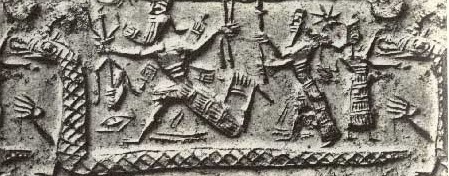episode download available: here
0:01:34 - psa: David Suzuki on eating local
0:01:54 - promo: pro-bono radio show
0:02:47 - 'Sacred Ground' by David Maracle
0:06:13 - 'Veni Creator Spiritus' by Coral Vertice
'":"":"" - (talking: about iroquoian love flute and cosmogonies)
0:09:46 - 'Instant 0' by Bernard Parmegiani
0:14:29 - 'Cosmogony' by Bjork
0:19:19 - 'First Selam' by The Mevlevi Ensemble of Turkey
'":"":"" - (talking: about the first selam and Catherine Keller) [1], [2]
0:23:40 - 'Face of the Deep' by Wayne Shorter
0:29:19 - ad: the senior's centre
0:29:51 - promo: below the decks (radio show)
0:30:23 - 'Genesis' by Toru Takemitsu
0:39:25 - 'Beautiful Things' by Gungor
0:44:34 - 'Eden' by Toro y Moi
0:49:05 - talking: about Paul Tillich's reading of Genesis, and the cosmic egg [3]
0:52:08 - 'Triangle' by Sounds from the Ground
1:02:16 - psa: Noam Chomsky on community radio
1:03:02 - promo: women's word (radio show)
1:03:22 - ad: paradiso's pizza
1:03:58 - 'I Live Inside an Egg' by James Pants
1:06:10 - talking about: 'golden egg' of the upanishads, irish mythology, and Annie Dillard
1:08:40 - 'Genesis Theme' by Ravi Shankar
1:10:02 - 'The Tides of Manunaun' by Henry Cowell
1:13:11 - 'Me To Datee' by Danielson Famile
1:16:45 - 'Songline' by David Hudson and Steve Roach
1:19:46 - talking about: 'golden egg' of the upanishads, irish mythology, and Annie Dillard
1:22:20 - 'Creation' by Iasos
1:24:02 - 'Genesis' by Grimes
1:28:17 - promo: OPIRG
1:28:58 - promo: suspended particulate (radio show)
1:29:30 - promo: civic guilt
1:30:30 - station id: Jack Layton
"Why didn't someone hand those newly sighted people paints and brushes from the start, when they still didn't know what anything was? Then maybe we all could see color-patches too, the world unraveled from reason, Eden before Adam gave names. The scales would drop from my eyes; I'd see trees like men walking; I'd run down the road against all orders, hallooing and leaping... It is ironic that the one thing that all religions recognize as separating us from our creator--our very self-consciousness--is also the one thing that divides us from our fellow creatures. It was a bitter birthday present from evolution, cutting us off at both ends...
Self-consciousness... hinder[s] the experience of the present. It is the one instrument that unplugs all the rest. So long as I lose myself in a tree, say, I can scent its leafy breath or estimate its board feet of lumber, I can draw its fruits or boil tea on its branches, and the tree stays tree. But the second I become aware of myself at any of these activities... the tree vanishes, uprooted from the spot and flung out of sight as if it had never grown. And time, which had flowed down into the tree bearing new revelations like floating leaves at every moment, ceases. It dams, stills, stagnates. Self-consciousness is the curse... Innocence is a better world. Innocence sees that this is it, and finds it world enough,"
- Annie Dillard (Pilgrim at Tinker Creek)
Further Info (if you're interested):
[1] 'The Face of the Deep: A Theology of Becoming' by Catherine Keller
[2] Video Lecture of Mary-Jane Rubenstein on the Multiverse (with a neat introduction to Catherine Keller's reading of Genesis, and other interesting theologians and scientists inside and outside of their respective 'orthodoxies'.)
[3] 'The Eternal Now' by Paul Tillich

No comments:
Post a Comment